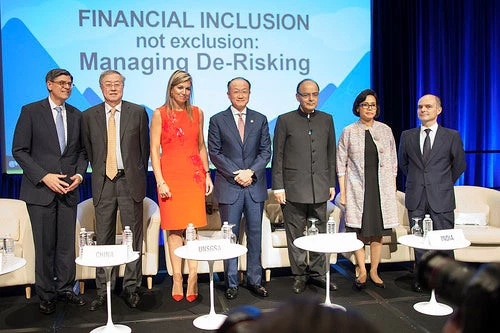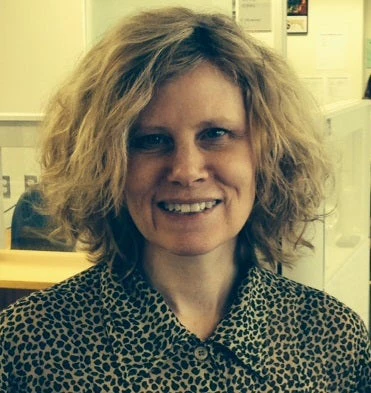Government leaders and advocates came together during the Annual Meetings to discuss a major development goal – ensuring everyone has access to affordable financial services such as a bank or mobile money account. While a lot of progress has been made on “financial inclusion,” new rules affecting the flow of funds threatens to slow or even reverse some gains.
Financial Inclusion not Exclusion: Managing De-Risking brought together Queen Máxima of the Netherlands, US Treasury Secretary Jack Lew, Zhou Xiaochuan, Governor of the People’s Bank of China, Sri Mulyani Indrawati, Indonesia’s Minister of Finance. Arun Jaitley, India’s Minister of Finance, World Bank Group President Jim Yong Kim, and Juan Manuel Vega-Serrano, the president of the Financial Action Tax Force (FATF), which sets international standards for combating money laundering, terrorist financing and other related threats.
Some 700 million people were brought into the formal financial system between 2011 and 2014 – a major success – but 2 billion people remain cut off, said Queen Máxima, who is the United Nations Secretary-General’s special advocate for inclusive finance for development.
A new challenge to financial inclusion is a trend toward “de-risking” by banks. Many larger banks are increasingly terminating or restricting business relationships with remittance companies and smaller local banks in certain regions of the world. De-risking has therefore made money transfers more difficult for migrant workers and humanitarian organizations working in war-torn places.
Although some banks may be terminating business relationships for bottom-line profitability reasons, other banks may be concerned about complying with regulations related to anti-money laundering/combatting financing of terrorism risks – known as AML/CFT.
Lew said financial institutions around the world have to adhere to high standards to stop the flow of illicit funds. However, “if the burden is so high that people withdraw from the financial system or are excluded from it, the risks of illicit transactions rises,” he said.
Vega-Serrano said de-risking is a complex problem and it’s unfortunate international standards have been interpreted in a way that has led to the withdrawal of financial services. However, fighting corruption can be fully compatible with bringing more people into the financial system, he said.
The Bank Group has committed to help financial service providers and governments reach 1 billion adults with transaction accounts by 2020. Already, some 640 million people have been reached, said Kim.
Zhou Xiaochuan said China put digital financial inclusion at the core of recent G20 discussions. New technologies are enabling rapid progress in financial inclusion and also helping to track money laundering, he said.
In India, rapid progress on financial inclusion occurred after the country established a digital identification system covering 1 billion people, said Jaitley. He said the system helped identify who was entitled to benefits through the national insurance program and who was not – generating “huge savings” now being used to assist the bottom 20 percent of Indian society. The next step was connecting some 240 million people to the banking system so they could receive digital payments through the national insurance system.
Sri Mulyani Indrawati, the finance minister of Indonesia, said Indonesia is seeking “quick wins” on financial inclusion by moving to digital payments to 15.3 million poor families who today receive cash transfers. Indonesia also plans to increase the number of people using bank accounts to tap credit – critical to support entrepreneurship and the growth of small and medium businesses. “For Indonesia, it’s quite unique. Female using account in the bank is higher than the male,” said Indrawati. “You can give applause for that.”
“Financial inclusion is not only pro-growth, it’s pro-poor,” said Queen Maxima.


Join the Conversation